Agency Authority: Tutorial Questions, Cases, and Analysis - Law
VerifiedAdded on 2023/01/12
|7
|1131
|100
Homework Assignment
AI Summary
This assignment solution delves into the core concepts of agency law, examining the distinctions between actual and apparent authority, illustrated with case references. It analyzes a scenario involving Melissa, an agent, and her actions exceeding her authorized spending limit, addressing whether her company is obligated to purchase the excess stationery and whether Melissa could be held liable. The solution outlines the duties agents owe to their principals, encompassing fiduciary and general duties, and details the rights agents possess, such as the right to remuneration and reimbursement. Furthermore, it explores the circumstances under which an agent can be held liable to third parties, providing a comprehensive overview of agency law principles.
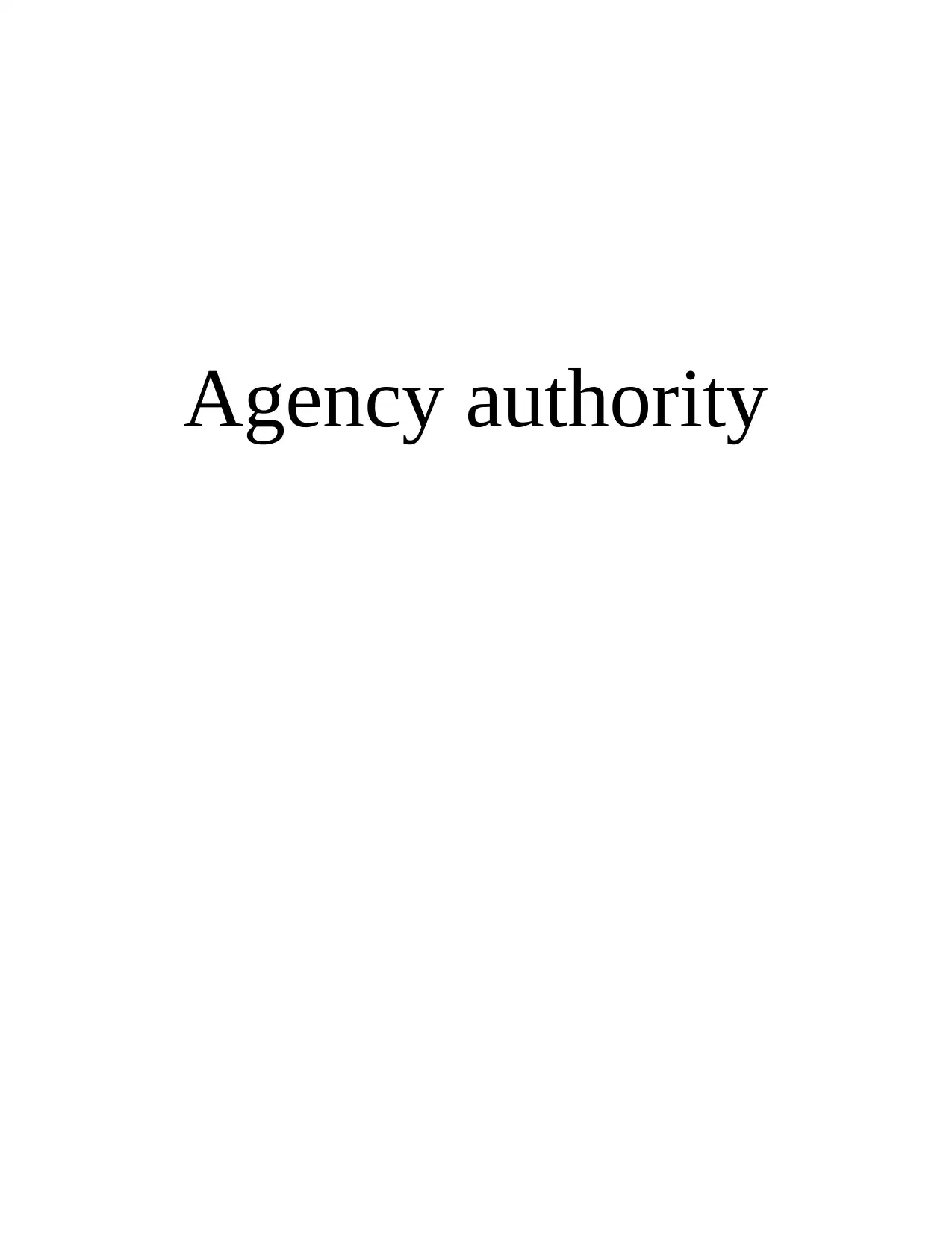
Agency authority
Paraphrase This Document
Need a fresh take? Get an instant paraphrase of this document with our AI Paraphraser
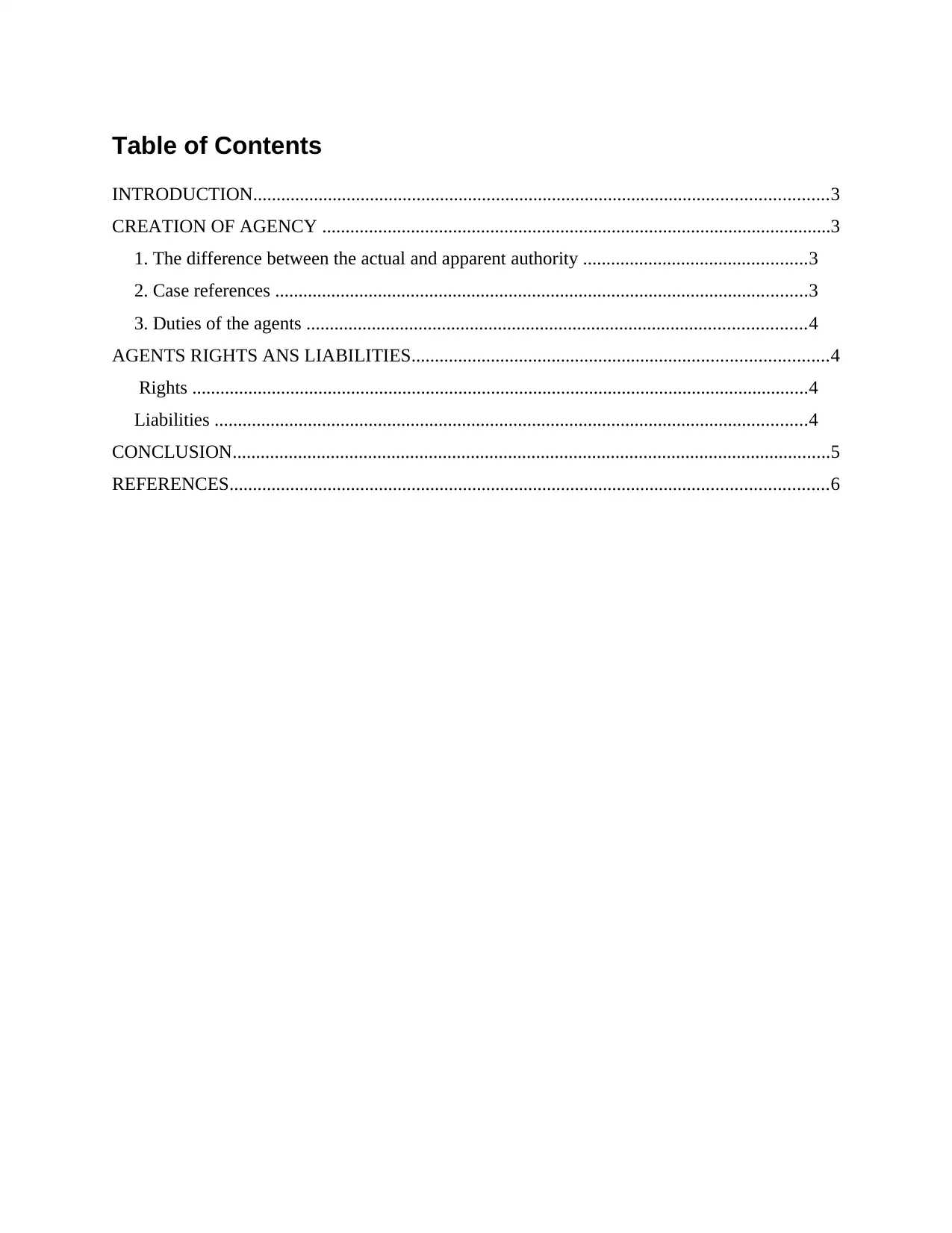
Table of Contents
INTRODUCTION...........................................................................................................................3
CREATION OF AGENCY .............................................................................................................3
1. The difference between the actual and apparent authority ................................................3
2. Case references ..................................................................................................................3
3. Duties of the agents ...........................................................................................................4
AGENTS RIGHTS ANS LIABILITIES.........................................................................................4
Rights ....................................................................................................................................4
Liabilities ...............................................................................................................................4
CONCLUSION................................................................................................................................5
REFERENCES................................................................................................................................6
INTRODUCTION...........................................................................................................................3
CREATION OF AGENCY .............................................................................................................3
1. The difference between the actual and apparent authority ................................................3
2. Case references ..................................................................................................................3
3. Duties of the agents ...........................................................................................................4
AGENTS RIGHTS ANS LIABILITIES.........................................................................................4
Rights ....................................................................................................................................4
Liabilities ...............................................................................................................................4
CONCLUSION................................................................................................................................5
REFERENCES................................................................................................................................6
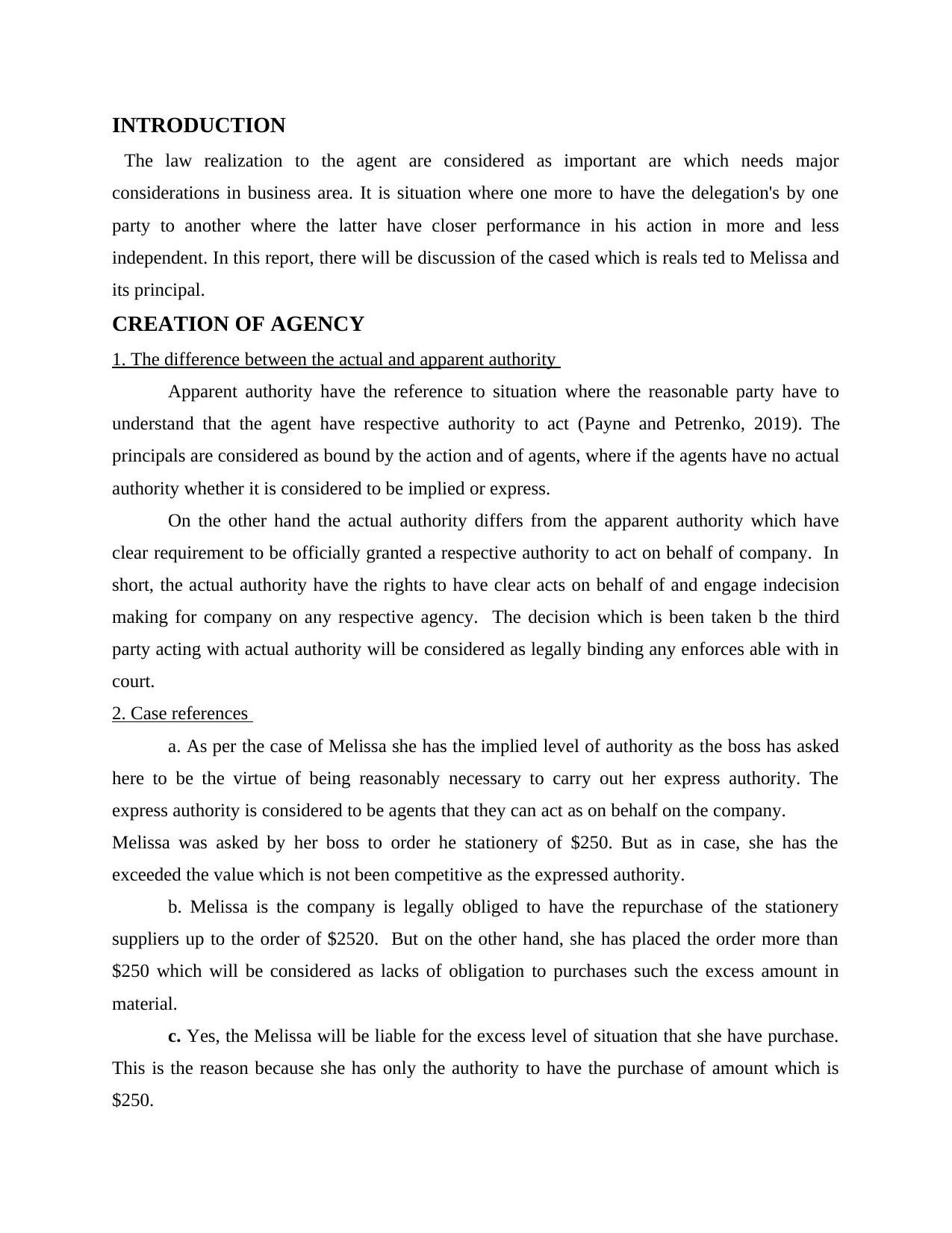
INTRODUCTION
The law realization to the agent are considered as important are which needs major
considerations in business area. It is situation where one more to have the delegation's by one
party to another where the latter have closer performance in his action in more and less
independent. In this report, there will be discussion of the cased which is reals ted to Melissa and
its principal.
CREATION OF AGENCY
1. The difference between the actual and apparent authority
Apparent authority have the reference to situation where the reasonable party have to
understand that the agent have respective authority to act (Payne and Petrenko, 2019). The
principals are considered as bound by the action and of agents, where if the agents have no actual
authority whether it is considered to be implied or express.
On the other hand the actual authority differs from the apparent authority which have
clear requirement to be officially granted a respective authority to act on behalf of company. In
short, the actual authority have the rights to have clear acts on behalf of and engage indecision
making for company on any respective agency. The decision which is been taken b the third
party acting with actual authority will be considered as legally binding any enforces able with in
court.
2. Case references
a. As per the case of Melissa she has the implied level of authority as the boss has asked
here to be the virtue of being reasonably necessary to carry out her express authority. The
express authority is considered to be agents that they can act as on behalf on the company.
Melissa was asked by her boss to order he stationery of $250. But as in case, she has the
exceeded the value which is not been competitive as the expressed authority.
b. Melissa is the company is legally obliged to have the repurchase of the stationery
suppliers up to the order of $2520. But on the other hand, she has placed the order more than
$250 which will be considered as lacks of obligation to purchases such the excess amount in
material.
c. Yes, the Melissa will be liable for the excess level of situation that she have purchase.
This is the reason because she has only the authority to have the purchase of amount which is
$250.
The law realization to the agent are considered as important are which needs major
considerations in business area. It is situation where one more to have the delegation's by one
party to another where the latter have closer performance in his action in more and less
independent. In this report, there will be discussion of the cased which is reals ted to Melissa and
its principal.
CREATION OF AGENCY
1. The difference between the actual and apparent authority
Apparent authority have the reference to situation where the reasonable party have to
understand that the agent have respective authority to act (Payne and Petrenko, 2019). The
principals are considered as bound by the action and of agents, where if the agents have no actual
authority whether it is considered to be implied or express.
On the other hand the actual authority differs from the apparent authority which have
clear requirement to be officially granted a respective authority to act on behalf of company. In
short, the actual authority have the rights to have clear acts on behalf of and engage indecision
making for company on any respective agency. The decision which is been taken b the third
party acting with actual authority will be considered as legally binding any enforces able with in
court.
2. Case references
a. As per the case of Melissa she has the implied level of authority as the boss has asked
here to be the virtue of being reasonably necessary to carry out her express authority. The
express authority is considered to be agents that they can act as on behalf on the company.
Melissa was asked by her boss to order he stationery of $250. But as in case, she has the
exceeded the value which is not been competitive as the expressed authority.
b. Melissa is the company is legally obliged to have the repurchase of the stationery
suppliers up to the order of $2520. But on the other hand, she has placed the order more than
$250 which will be considered as lacks of obligation to purchases such the excess amount in
material.
c. Yes, the Melissa will be liable for the excess level of situation that she have purchase.
This is the reason because she has only the authority to have the purchase of amount which is
$250.
⊘ This is a preview!⊘
Do you want full access?
Subscribe today to unlock all pages.

Trusted by 1+ million students worldwide
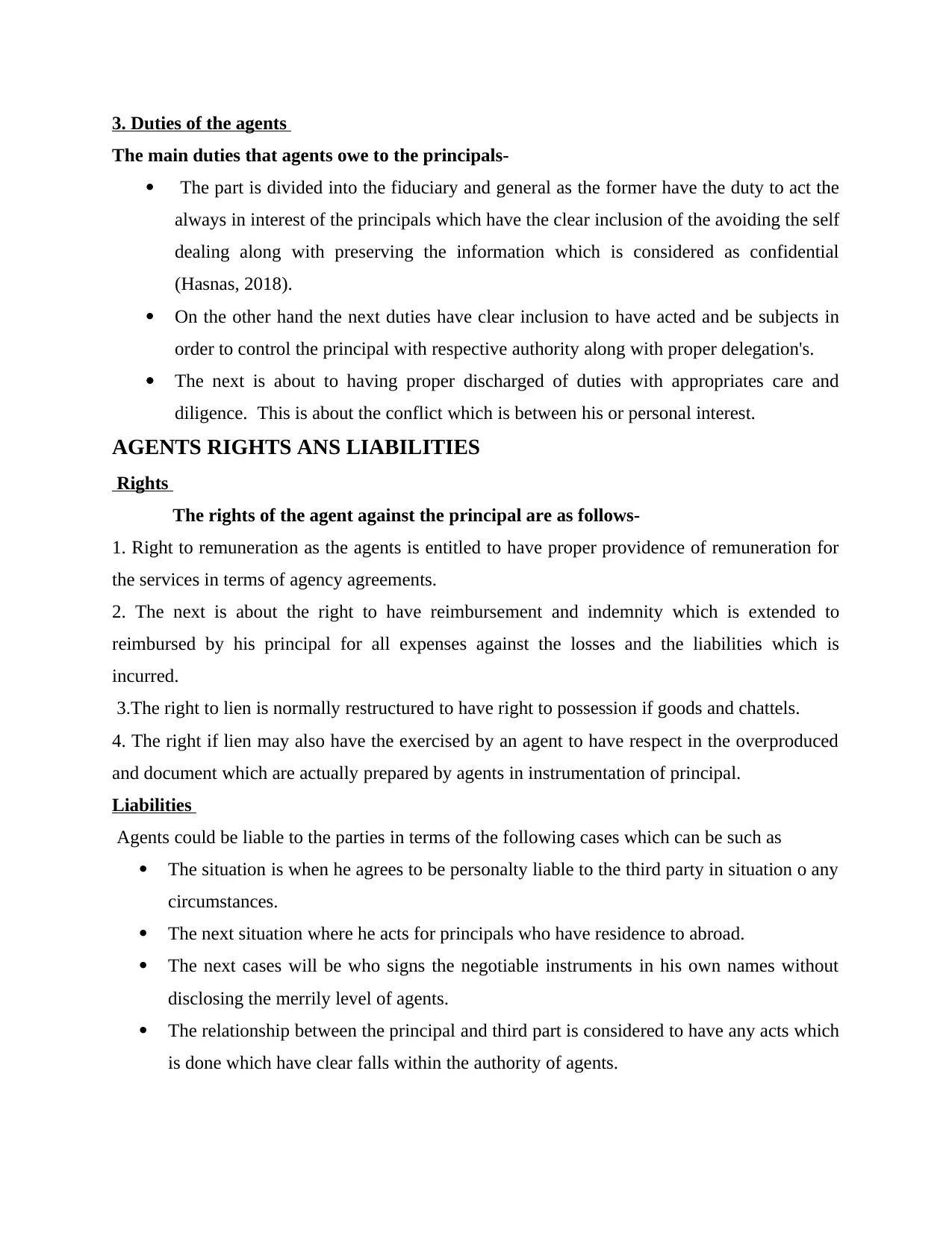
3. Duties of the agents
The main duties that agents owe to the principals-
The part is divided into the fiduciary and general as the former have the duty to act the
always in interest of the principals which have the clear inclusion of the avoiding the self
dealing along with preserving the information which is considered as confidential
(Hasnas, 2018).
On the other hand the next duties have clear inclusion to have acted and be subjects in
order to control the principal with respective authority along with proper delegation's.
The next is about to having proper discharged of duties with appropriates care and
diligence. This is about the conflict which is between his or personal interest.
AGENTS RIGHTS ANS LIABILITIES
Rights
The rights of the agent against the principal are as follows-
1. Right to remuneration as the agents is entitled to have proper providence of remuneration for
the services in terms of agency agreements.
2. The next is about the right to have reimbursement and indemnity which is extended to
reimbursed by his principal for all expenses against the losses and the liabilities which is
incurred.
3.The right to lien is normally restructured to have right to possession if goods and chattels.
4. The right if lien may also have the exercised by an agent to have respect in the overproduced
and document which are actually prepared by agents in instrumentation of principal.
Liabilities
Agents could be liable to the parties in terms of the following cases which can be such as
The situation is when he agrees to be personalty liable to the third party in situation o any
circumstances.
The next situation where he acts for principals who have residence to abroad.
The next cases will be who signs the negotiable instruments in his own names without
disclosing the merrily level of agents.
The relationship between the principal and third part is considered to have any acts which
is done which have clear falls within the authority of agents.
The main duties that agents owe to the principals-
The part is divided into the fiduciary and general as the former have the duty to act the
always in interest of the principals which have the clear inclusion of the avoiding the self
dealing along with preserving the information which is considered as confidential
(Hasnas, 2018).
On the other hand the next duties have clear inclusion to have acted and be subjects in
order to control the principal with respective authority along with proper delegation's.
The next is about to having proper discharged of duties with appropriates care and
diligence. This is about the conflict which is between his or personal interest.
AGENTS RIGHTS ANS LIABILITIES
Rights
The rights of the agent against the principal are as follows-
1. Right to remuneration as the agents is entitled to have proper providence of remuneration for
the services in terms of agency agreements.
2. The next is about the right to have reimbursement and indemnity which is extended to
reimbursed by his principal for all expenses against the losses and the liabilities which is
incurred.
3.The right to lien is normally restructured to have right to possession if goods and chattels.
4. The right if lien may also have the exercised by an agent to have respect in the overproduced
and document which are actually prepared by agents in instrumentation of principal.
Liabilities
Agents could be liable to the parties in terms of the following cases which can be such as
The situation is when he agrees to be personalty liable to the third party in situation o any
circumstances.
The next situation where he acts for principals who have residence to abroad.
The next cases will be who signs the negotiable instruments in his own names without
disclosing the merrily level of agents.
The relationship between the principal and third part is considered to have any acts which
is done which have clear falls within the authority of agents.
Paraphrase This Document
Need a fresh take? Get an instant paraphrase of this document with our AI Paraphraser
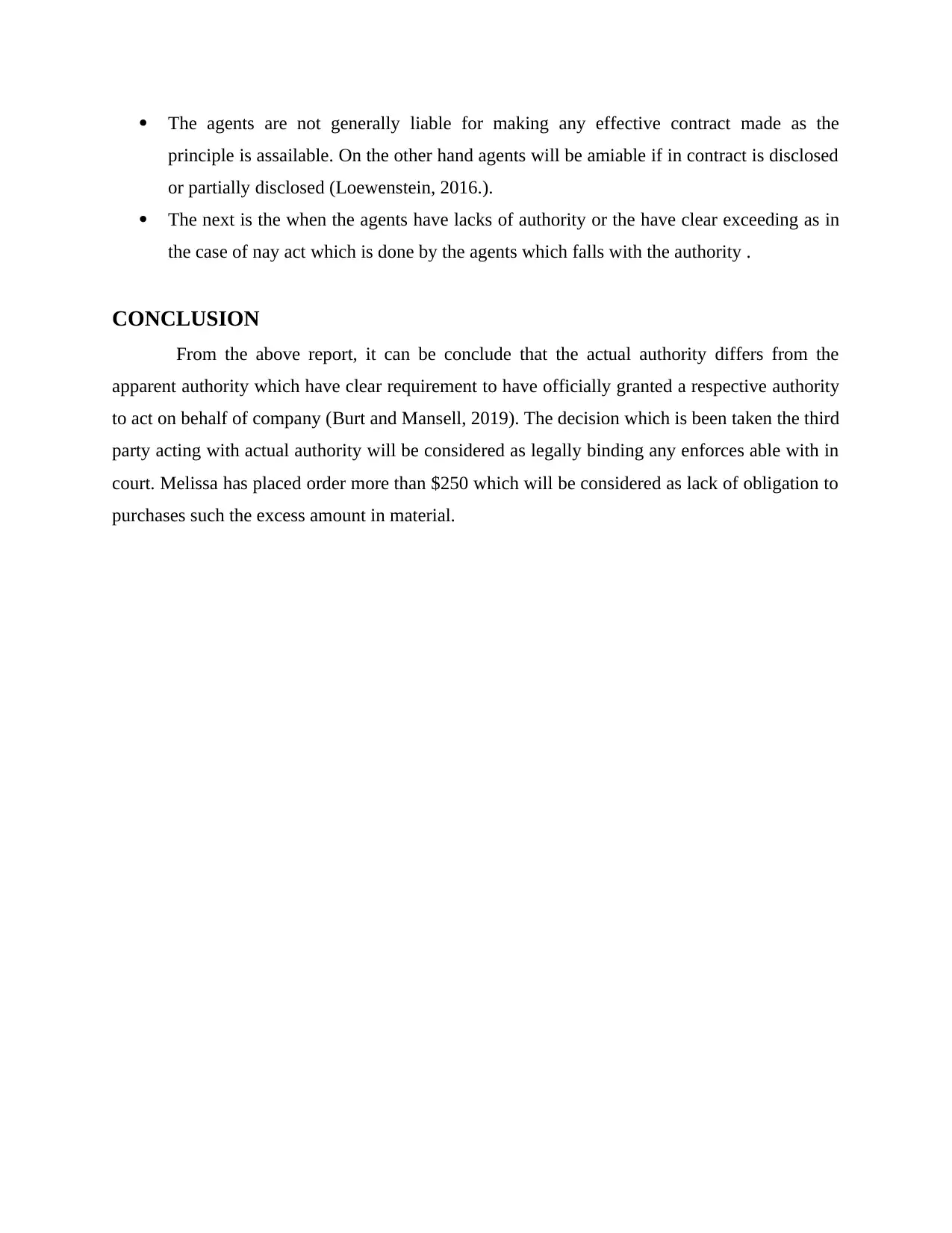
The agents are not generally liable for making any effective contract made as the
principle is assailable. On the other hand agents will be amiable if in contract is disclosed
or partially disclosed (Loewenstein, 2016.).
The next is the when the agents have lacks of authority or the have clear exceeding as in
the case of nay act which is done by the agents which falls with the authority .
CONCLUSION
From the above report, it can be conclude that the actual authority differs from the
apparent authority which have clear requirement to have officially granted a respective authority
to act on behalf of company (Burt and Mansell, 2019). The decision which is been taken the third
party acting with actual authority will be considered as legally binding any enforces able with in
court. Melissa has placed order more than $250 which will be considered as lack of obligation to
purchases such the excess amount in material.
principle is assailable. On the other hand agents will be amiable if in contract is disclosed
or partially disclosed (Loewenstein, 2016.).
The next is the when the agents have lacks of authority or the have clear exceeding as in
the case of nay act which is done by the agents which falls with the authority .
CONCLUSION
From the above report, it can be conclude that the actual authority differs from the
apparent authority which have clear requirement to have officially granted a respective authority
to act on behalf of company (Burt and Mansell, 2019). The decision which is been taken the third
party acting with actual authority will be considered as legally binding any enforces able with in
court. Melissa has placed order more than $250 which will be considered as lack of obligation to
purchases such the excess amount in material.
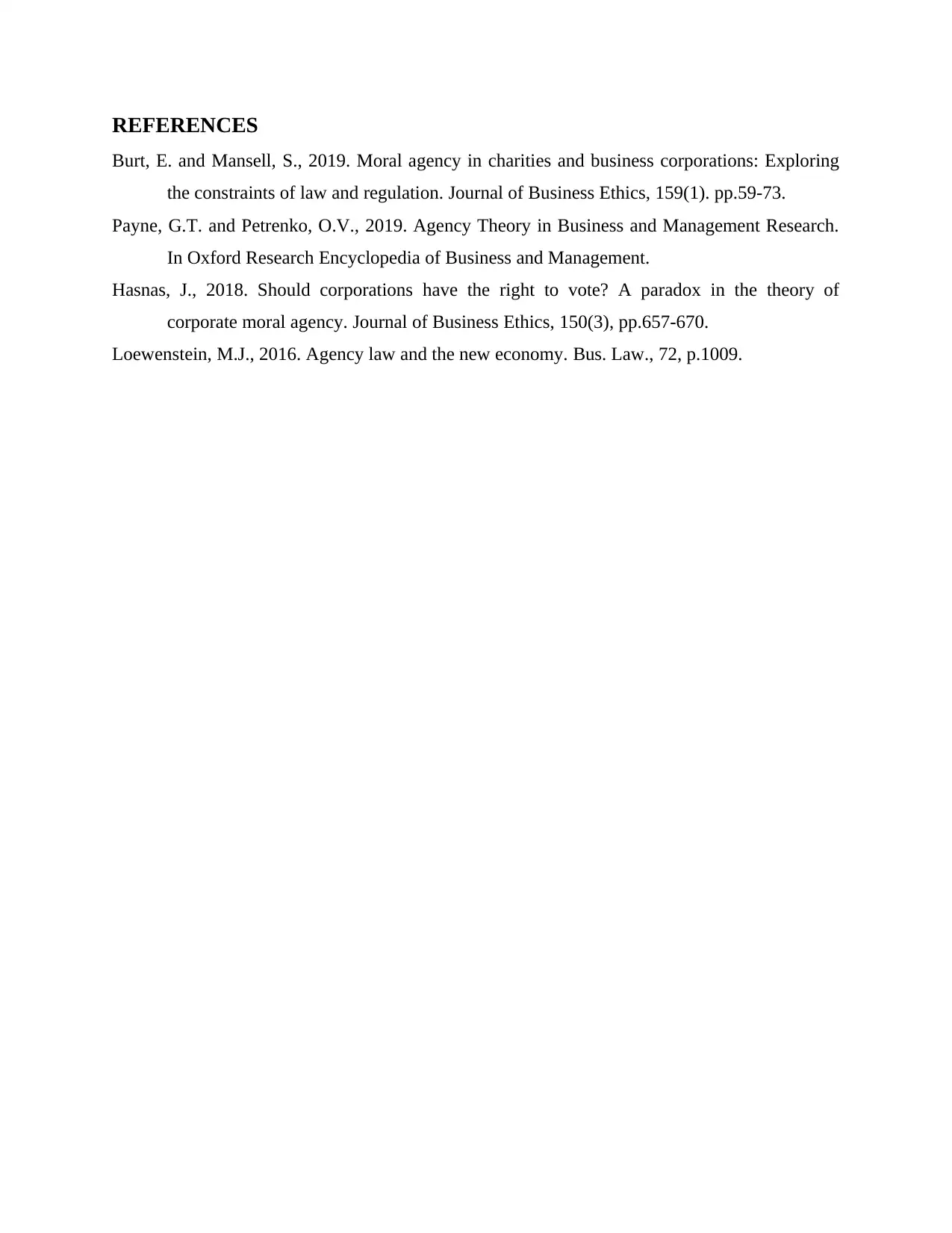
REFERENCES
Burt, E. and Mansell, S., 2019. Moral agency in charities and business corporations: Exploring
the constraints of law and regulation. Journal of Business Ethics, 159(1). pp.59-73.
Payne, G.T. and Petrenko, O.V., 2019. Agency Theory in Business and Management Research.
In Oxford Research Encyclopedia of Business and Management.
Hasnas, J., 2018. Should corporations have the right to vote? A paradox in the theory of
corporate moral agency. Journal of Business Ethics, 150(3), pp.657-670.
Loewenstein, M.J., 2016. Agency law and the new economy. Bus. Law., 72, p.1009.
Burt, E. and Mansell, S., 2019. Moral agency in charities and business corporations: Exploring
the constraints of law and regulation. Journal of Business Ethics, 159(1). pp.59-73.
Payne, G.T. and Petrenko, O.V., 2019. Agency Theory in Business and Management Research.
In Oxford Research Encyclopedia of Business and Management.
Hasnas, J., 2018. Should corporations have the right to vote? A paradox in the theory of
corporate moral agency. Journal of Business Ethics, 150(3), pp.657-670.
Loewenstein, M.J., 2016. Agency law and the new economy. Bus. Law., 72, p.1009.
⊘ This is a preview!⊘
Do you want full access?
Subscribe today to unlock all pages.

Trusted by 1+ million students worldwide

1 out of 7
Related Documents
Your All-in-One AI-Powered Toolkit for Academic Success.
+13062052269
info@desklib.com
Available 24*7 on WhatsApp / Email
![[object Object]](/_next/static/media/star-bottom.7253800d.svg)
Unlock your academic potential
Copyright © 2020–2026 A2Z Services. All Rights Reserved. Developed and managed by ZUCOL.





